
LOCOMOTIVE JOURNAL
LITTLEHAMPTON
JANUARY 2008
17 years on – justice for ASLEF man convicted of manslaughter
THE Court of Appeal last month quashed a train driver’s 17 year old conviction for manslaughter.
Bob Morgan, a train driver and ASLEF member, was convicted of two counts of manslaughter on 3 September 1990. He was sentenced to 18 months in jail, of which 12 were suspended, after he had admitted passing signal T168 while it was red – an event which contributed to the Purley train crash of 4 March 1989.
However, the original conviction had not taken into proper account the fact that this signal was dangerous. It had been passed at danger on four different drivers – between 16 October 1984 and the Purley tragedy. This occurred again on 6 June 1991. Since the fault with the signalling has been remedied, no trains have passed T168 at danger.
At the trial neither the prosecution nor the defence were aware that signal T168 was a ‘multi-SPAD’ (regularly passed at danger) signal – which is why Bob was advised to plead guilty. Today a signal with this history would be immediately assessed for risk and action would be taken to remedy the danger. This did not happen in 1989.
The accident happened at 13.39 when Bob Morgan’s train, travelling from Littlehampton to London, crashed into the back of a train travelling from Horsham to London. The Littlehampton train careered off the track, down the embankment into gardens below. 6 people died and 80 were injured.
ASLEF general secretary Keith Norman, said he was proud that the union had stood by Bob Morgan throughout his 17-year ordeal, ‘I am delighted that Bob has been vindicated. It was important not only for his peace of mind and reputation, but for all other UK train drivers. Today’s verdict should ensure that no train driver in the future will have to face such a terrible ordeal.
‘We have established that where safety issues – like and unsafe signals – contribute to an accident, the driver will never again be the single person held to account – which is what happened in Bob’s case.
‘Over a period of several years, drivers found it difficult to see the signal in question – a fact proven by the number of different drivers who passed it signalled at danger.
‘The tragedy for Bob and his family was that no one in management admitted their inefficiency or neglect. Instead, they slunk away, happy to leave Bob to carry the can for them all. There was no consideration of corporate responsibility – simply the desire by managers to escape blame by pointing a finger at an individual. Bob paid the price for the inefficiency and carelessness of layer upon layer of management.
‘We can never undo the harm Bob has endured - but we can admire the dignity with which he bore the burden of the last 17 years.
LOCOMOTIVE JOURNAL
LITTLEHAMPTON
FEBRUARY 2008
17 long years - the case of Driver Morgan
In last month’s edition we reported that – after 17 years – Driver Bob Morgan’s conviction for manslaughter had been quashed. But how can it take almost two decades to secure justice? And how do you set about trying to remedy something like this after so long? We asked Gary Rubin of Andrews Angels Solicitors – whose persistence and tenacity played such a major part in the successful outcome. This is what he told us…..
I FIRST met Bob Morgan in 1997 when I was part of a team representing Peter Afford, the driver involved in the Watford train crash of the previous year. The Watford signal, like T168, had been passed at danger 4 times previously. Peter’s defence was that the railway infrastructure was the underlying cause of the crash.
It was clear from the judge’s summing up that he was not enthusiastic about the defence – and the media were baying for blood. Despite this, it took the jury little more than an hour to acquit him. I thought then that the similarities to Bob’s case could lead to our being able to prove Bob’s innocence.
Understanding of the causes of SPADs increased as a result of the Southall and Ladbroke Grove Public Inquiries in 1997 and 1999. Ladbroke Grove involved another multi-SPAD signal - SN109 had been passed 8 times. Lord Cullen’s report exonerated Michael Hodder, the driver of the SPADing Thames Train - and pointed the finger at Railtrack and its signal.
HOPEFUL SIGNS
The tide was beginning to turn. No longer would the driver be automatically blamed for passing signals at danger. However, it was not until 2007 that Network Rail (formerly Railtrack) was eventually convicted of breaching the Heath and Safety at Work Act 1974. Fining the company £4m, the judge said that where there was a multi-SPAD signal it was the signal that was the common factor - not the driver.
By late 2004 I believed there was enough evidence to put forward a positive case for an appeal for Driver Morgan – and Bob instructed me to proceed.
In breaching the Heath and Safety at Work Act 1974. Fining the company £4m, the judge said that where there was a multi-SPAD signal it was the signal that was the common factor - not the driver.
By late 2004 I believed there was enough evidence to put forward a positive case for an appeal for Driver Morgan – and Bob instructed me to proceed.
HELPFUL EXPERTS
It took time to get the case into shape, especially as everyone involved gave their time free of charge. This included industry experts Roy Bell, Peter Rayner, Professor Groeger and Dr Murphy – whose evidence had helped Peter Afford, Larry Harrison (who was acquitted of manslaughter in relation to Southall) and ASLEF at the public inquiries. Then Alan Cooksey, the former Deputy Chief Inspector of the railway inspectorate (HMRI) came forward. He had originally investigated the crash for the Department of Transport – and he too was convinced Bob was not guilty
HURDLES TO JUMP
We needed a special hearing of the Full Court of Appeal to get permission to Appeal. This was for two reasons - we were nearly 17 years out of time to lodge an appeal - and Bob had pleaded guilty at his original trial. It was a long hearing and it was touch-and-go as to whether we would succeed -but – on 22 March 2007 - we did.
When the prosecution saw the fresh evidence - setting out the understanding we have today of the causes of SPADs - they decided not to oppose the appeal.
In quashing Bob’s conviction Lord Justice Latham said, ‘Clearly, something about the infrastructure of this particular junction was causing mistakes to be made. This was an accident waiting to happen.’
This was our case in a nutshell.
JUSTICE AT LAST
Immediately after the hearing a reporter asked Bob how he felt. ‘Overwhelmed,’ was his reply. He was not the only one. After this long struggle it was hard to believe we had achieved our goal. Everyone from the legal team to the ASLEF delegation, present in court on that emotionally charged day, would agree the sense of achievement was truly ‘overwhelming’.
Bob’s name was cleared just a month before his 65th birthday, when he bids farewell to the railway. I’m sure we all wish him a long and happy retirement. He deserves it.
Last December Bob Morgan’s conviction for manslaughter following the Purley train crash of March 1989 was quashed by the Court of Appeal.
Bob had passed signal T168 at danger and collided with the rear of another train at Purley station. 5 passengers died and many more were injured.
Bob’s AWS was working. He saw the red signal and braked – but it was too late. He could neither recollect the cautionary signals nor explain what had happened. Bob pleaded guilty to manslaughter and went to prison.
However, T168 had been passed at danger on 4 previous occasions, and there was another SPAD 18 months later. After double blocking was applied (later adapted to a delayed yellow) there were no more SPADs.
LOCOMOTIVE JOURNAL
FEBRUARY 2008
BACK THE CONCESSION CLAIM
I REGULARLY travel up to Newcastle on my privilege pass – but when my wife comes with me, it’s cheaper to drive than take the train. Here’s a breakdown:
Two ‘privilege’ return tickets London to Newcastle: £124.50 – 600 miles driving @ 7 miles per litre: £86
As an employee of Go-Via I can travel to Crewe for free. From there the privilege return to Newcastle for 2 people is £57.10. However it involves over 6 hours travel and at least 3 changes.
My Gatwick Express brothers at Battersea currently have ‘boxes’ on National Express East Coast - but will lose them when the franchise changes to Go-Via. They lost their boxes on Silverlink when Go-Via gave leisure staff travel to everyone on the London Midland franchise - but they’ll get them back when Go-Via takes over Gatwick Express.
Confused? You should be! The current system is a farce. Drivers who want to use their travel will find it easier and cheaper to get the train to Poland than Scotland!
I would encourage everyone to back the ASLEF campaign to improve driver travel concessions -and end the nonsense in 2008.
DAVE WOODFORD
Battersea Branch
LOCOMOTIVE JOURNAL
FEBRUARY 2008
Free travel not expensive for companies
LAST month it took me 6 and a half hours to drive to Manchester to visit family, sitting in traffic jams on the M25, M42 and M6. I grew increasingly irritated that, as a driver for Southern, I was forced to use my car. Unless I book months in advance with Virgin, the fares are far more than the cost of diesel. I am of course entitled to 75% off the standard open return - but as this is well over £200 it is no good to me and my family. use their boxes - so the cost to the TOCs to issue all drivers with boxes cannot be that high.
Bro Daniel Hogg
Battersea Branch
LOCOMOTIVE JOURNAL
MARCH 2008
DISHARMONY IN BRIGHTON
I’M writing in response to the FCC Company Council letter in February’s Journal. In October I wrote to you concerning the reality of harmonisation within FCC. Although you said it would be printed in December – it wasn’t.
Instead there was an article extolling the virtues of harmonisation and a letter from a FGW
rep encouraging members to vote for harmonisation at FGW. If you’d printed my letter it
would have given FGW members something to consider when deciding whether to vote yes
or no.
The FCC council have missed the point. The cause of the anger and mistrust is not the
harmonisation deal (which we voted to accept) – but the fact that after ‘interpretation’
meetings with union officials the deal implemented is significantly different to that voted on.
As a result one company council has been voted out – and others may follow.
If anyone would like to read my original letter, email me and I will forward it.
Steve Cork
F.C.C. Brighton
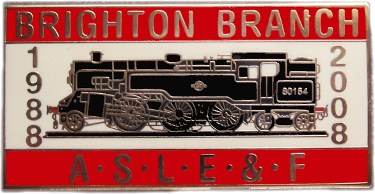
LOCOMOTIVE JOURNAL
MARCH 2008
YOU TAKES YOUR CHOICE, YOU PAYS YOUR MONEY
I WRITE in response to Tim Stedman’s letter in the February 2008 Journal regarding staff
travel. I agree that if employed in the rail industry, rail travel should be free to all, not just
train drivers – but as regards to being discriminated against for joining the railway after 31
March 1996, I have to strongly disagree.
I joined the railway in 1990 as a railway trainee with a wage of about £76 a week. This came with the perk of free rail travel.
In 1998 just before DRI was agreed, a driver’s wage had risen to £222.15p a week before tax. Wages weren’t so appealing when the railway was in the public sector.
Unfortunately – like it or not – we now work in the private sector. When, in 2000, I chose to
move to a different TOC, I lost 10 years seniority. Does this mean I’m being discriminated
against – because I chose to move to a different TOC? No! – because it was my choice! So if we all get free rail travel, then surely we should all keep our seniority? (Then when they close my depot in December I might get my 1st choice for relocation rather than my 3rd) !
I’m sure if I worked for Easy Jet I wouldn’t get free or discounted flights with British Midland.
A. Gregg
Brighton branch
LOCOMOTIVE JOURNAL
APRIL 2008
ARTHUR PARMENTER
BOOT BOY TO FOOTPLATE
ARTHUR PARMENTER was born in 1916 in Hutton, Essex. He started work at the age of 14 as a boot boy in a large country house in the village. In 1941 he joined the railway, taking on an engine cleaner post at Stratford. In the course of time he progressed to become a driver.
In retirement Arthur enjoyed travelling and spent many holidays in most parts of world and the UK. He was also an avid whist player.
After living in the London area for many years Arthur moved to West Sussex early in 2007. He died on 4 November last year after a short illness.
F. HUGHES
retired driver – Selhurst
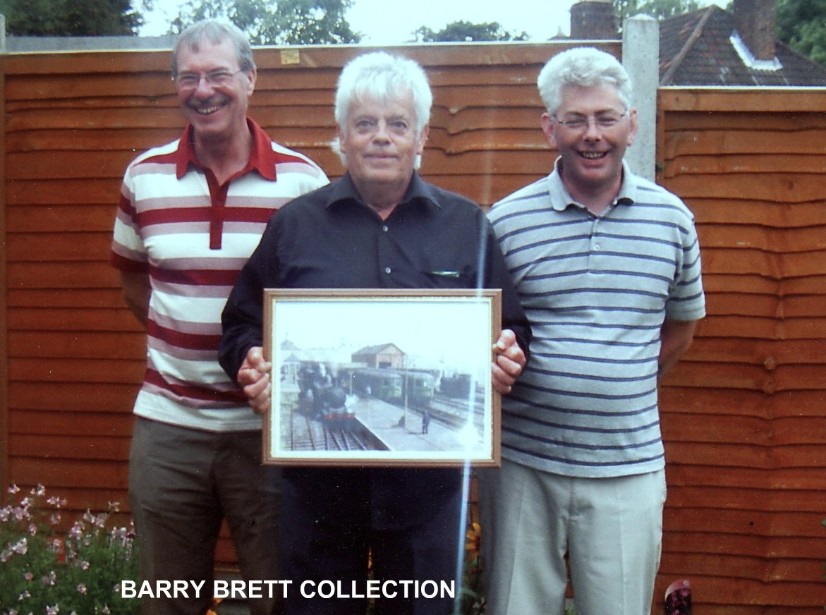
Brighton Drivers L-R Barry Brett, Stu Fuller and Paul Horan
Stu Fuller receiving his retirement presentation Stu started on the footplate on the 19.10.1964 at Hither Green, Addiscombe Seaford & Brighton.
This painting is of Seaford station post 1935.
LOCOMOTIVE JOURNAL
MAY 2008
ASBESTOS AWARD FOR RETIRED DRIVER
A retired driver has been awarded £180,000 in compensation after he was exposed to asbestos at work. Kenneth Chapman, 74, from Caterham, in Surrey, was diagnosed with cancer of the lining of the lung - mesothelioma - in January last year. He had worked for New Southern Railway, part of the British Rail from the 1950s until he retired in 1996. He was exposed to asbestos while working as a fireman, boiler cleaner and train driver. Asbestos was used on the boilers and pipes in the locomotives in which he worked on a daily basis. In fact, Ken recalls that asbestos dust was thrown into the air when a train he was in crashed into a buffer stop.
“No-one was hurt,” he said. "We got away with it then, but I suppose we are paying for it now. The asbestos dust was terrible and what I have got now is caused by it..” He said he had never heard of the disease when he was diagnosed but knew afterwards that he had developed it from working for British Rail.
"I have had a good life. But if someone caused this disease then they should pay for it. The employer let us work in those conditions and failed to make us aware of what it can do to our health,” Ken said, Thompson Solicitors took up the case when it was referred to them by A.S.L.E.&F.
LOCOMOTIVE JOURNAL
JULY 2008
SQUASH INTO GATWICK
Stephen Biggs, the secretary of the Gatwick Express Company Council, reports that the Class 460 UMU fleet used at the Gatwick branch are fitted with air conditioning but, he says, there are still issues with the adjustable Chapman seats and the exterior car door droplight windows.
Drivers have experienced back problems possibly due to the limited adjustments of the driving seat. There are also complaints about the droplight windows which are badly maintained so it can be difficult to open and close or vibrate and rattle when the rubber seals are removed to alleviate the resistance which causes excessive wind noise.
There is also a Class 73/2 loco based at Battersea Stewarts Land depot. It has no air cooling, partially adjustable seat and it is not routinely cleaned. The coupling adapters and technicians equipment are left on the cab floor, which creates a trip hazard.
All these matters continue to be pursued by the union.
LOCOMOTIVE JOURNAL
AUGUST 2008
Ken Chapman – his own man
YOU may have read recently the short Journal article about compensation for retired member K.L. Chapman. Sadly Ken has now succumbed to his illness.
Ken began his service at Redhill M.P.D. transferring to Three Bridges as a Fireman, before becoming a Driver at Caterham E.M.U.T. He spent the whole of his driving career at Caterham, and retired there in 1999.
Ken was not an active branch member but always gave his support to ASLEF on the many issues that required action from the rank and file membership. He was his own man, but was always willing to assist anyone who asked for help.
In the last few weeks of his life, as the cancer became intolerable, he was nursed at the Marie Curie Cancer Care Home in Caterham. As hard as he had tried to remain independent his strength failed him and the pain he was in caused him to seek the help of others.
Our thanks go to all the staff of Marie Curie for the comfort and support given so freely.
Roy Luxford
Southern
LOCOMOTIVE JOURNAL
SEPTEMBER 2008
THANKS FOR THE BADGE!
Having retired from the industry on 11 July 1998, I would like to thank the union very much for the 50 year medallion that the General Secretary sent to me recently. It has given me and my wife Rosie a lot of pleasure.
Ian Munro
Worthing Sussex
LOCOMOTIVE JOURNAL
OCTOBER 2008
JOHN NIVISON
A DRIVER WITH BOXING GLOVES
It is with sadness that I report the passing away of retired member John Nivison at the age of 73.
Born in 1934, John started his railway career two days after his 15th birthday at Woodside and South Croydon Railway as a junior porter. He then moved to Stewarts Lane as a cleaner, joining ASLEF in October 1950.
In 1952, whilst still at Stewarts Lane, he got his job as a fireman. From ’52 - ’54 he did his National Service and afterwards returned to his job, becoming a passed fireman in early ’59 and later that year getting his appointment as a driver at Norwood.
John was a driver for 14 years before promotion to various roles such as yard supervisor at New Cross Gate, traincrew supervisor at Holborn Viaduct and Hither Green and traction inspector at Norwood. His final move before retirement in 2000 was to Selhurst.
Even in retirement he still found time on his holidays to drive steam trains. I’m sure his Polish Brothers will miss him too!
People say that he spent all his waking hours at work! This can’t be true because he devoted an enormous amount of his time to the Croydon Amateur Boxing Club as well. He has touched the lives of many boxers from across the country from Southend and Sittingbourne to Chichester and Portsmouth.
He will be missed by a great many from the railway and from a sport he loved and gave so much to.
ANDREW COOK
Secretary
Selhurst Branch
LOCOMOTIVE JOURNAL
NOVEMBER 2008
MORE EMPLOYMENT, LESS WORKING REST DAYS
I WRITE in reply to Brother Steve Hill from Newton Heath branch. It is saddening to see such requests being made in the Locomotive Journal as the country enters recession.
I have been on the footplate for 34 years and, although I’ve lived and worked through many recessions, I’ve not worked a rest day for 11 years. Not once have I been threatened with redundancy, a shorter working week or a wage cut - but I know of many outside our industry who have.
So surely we should be grateful for the security the railway gives us. Perhaps instead of asking, ‘When are we going to get our overtime back?’, we should be saying to the companies, ‘You don’t have enough drivers - so you’d better start employing more.’ That way some of those poor people (which could include our own colleagues in the freight sector who are losing their jobs and houses) will be given the same opportunity as we have had.
Like Brother Davies, I despair at Thatcher’s legacy of, ‘I’m alright - so pull the ladder up.’
Roy Luxford
Three Bridges
LOCOMOTIVE JOURNAL
NOVEMBER 2008
MEDALLIONS FOR SELHURST PAIR
The Selhurst branch recently hosted an event to present two of its members – George Moore and John Kinnest - with the union’s coveted 50 year medallions.
George, who was born in 1936, started his railway career in 1952 as an engine cleaner at Farnley Junction, becoming a passed cleaner the following year. Two years later he left to do his National Service in Kenya until 1956.
He returned to Farnley Junction as a cleaner before he was promoted to Fireman at Low Moor, Bradford in 1960.
In 1962 he was transferred to York where he saw the last of the steam trains in passenger service and became a second man on the diesel. In 1967 he became a passed second man and early the next year he transferred to Wembley as passed senior second man.
In September 1969 he transferred to Selhurst as a driver.
He stayed at Selhurst for the next 28 years (brave man!) before retiring early due to ill health. George reached his 50 years as a member of ASLEF back in 2002.
John started his railway career in 1950 aged 15 as an engine cleaner. He spent a year cleaning before becoming a passed cleaner taking on firing duties on steam engines. In 1958 he passed out for driving at Redhill - but it wasn’t until October 1961 that he was appointed to the driving link.
In May 1984 he transferred to Victoria where he stayed until 1987 when ill health brought him to Selhurst to work in the Shunt Link until he retired in 1999.
Like George, John’s 50 year medallion was long overdue and well earned!
Selhurst Branch members were pleased to be able to help celebrate and recognise over 100 years of Aslef membership.
Andrew Cook
Secretary
Selhurst Branch
Railway accident on
LOCOMOTIVE JOURNAL
NOVEMBER 2008
ASLEF WAS THERE FOR ME
Following my diagnosis with acute myeloid leukaemia in May this year, I was admitted to the Royal Marsden hospital in Sutton for treatment. I had four courses of chemo and went into remission on the first hit. Fortunately I’m still in remission and I was able to return to work on 8 October.
I wanted to take this opportunity to thank the union reps of Selhurst branch for visiting me and supporting me throughout my treatment and to my return to work. Some people deserve special mention – especially Bro Ray ‘Mad Dog’ D’souza who visited me in hospital and made sure my sick notes reached the depot; our branch secretary Bro Andy ‘Cooky’ Cook for keeping all my colleagues at work informed of my progress and for encouraging them to send me loads of supporting emails; Bro Alex ‘Respect’ Holness for his messages of support; Bro Ian ‘Ninja’ Heriman for visiting and giving me a laugh at the low times (you know the story, Ninja!); Bro Mick ‘633 squadron’ Curtis for being a special mate; and to all my colleagues at Selhurst for their messages of support. You kept me smiling even at the low times.
Times like this bring out the best in people. To ASLEF’s Selhurst branch and all my colleagues: a big thank you.
Rich Castle
Selhurst Branch
LOCOMOTIVE JOURNAL
DECEMBER 2008
SLEEP WALKING TO TRAGEDY
Paul Overington a train driver working for Southern in Brighton, has written a moving and
disturbing account of a tragic death at his depot. It is an emotive piece of writing and some of his conclusions may not be universally shared. However Paul’s honesty and commitment
alone made it impossible not to print ….
On 15 October this year I experienced the saddest day of my driving career when I attended
the funeral of a colleague who took his own life at just 34 years of age.
To say the funeral was moving doesn’t even begin to tell the story. It was heartbreaking to
hear such great tributes from a congregation of over 600 about this highly talented athlete
and loving father to a six year old girl.
He followed in his grandfather’s footsteps and was thrilled to bits when he passed out as a
driver at Brighton.
His parents even filmed him emerging from Warrior Square tunnel on his maiden trip when he was seen punching the air and shouting, ‘This is for you, Granddad!’
To say I am incensed at this terrible loss is an understatement. How can a young man in his
prime make this awful decision?
And how was it that nobody saw there was a problem?
What stuck in my mind were the numerous comments made about the sleep depravation that
Luke had experienced ever since he became a Driver on Southern. I’m sure this is a familiar
tale around the entire network.
Imagine how we felt when one of his sisters said, ‘I hope you can sleep now, Luke.’ Tear-
jerking wasn’t the word.
We have drivers at Brighton who need to make their way to work from far afield to book on.
This can put an extra three hours on their day. The problem is that they can’t move nearer to
their home depot because of an agreement we have that says they ‘have to be at their allotted
depot for three years before applying to move to a depot nearer to their home’.
The answer we get from management - and ASLEF - when we challenge this unfair practise
is, ‘They knew this when they applied for the job.’
When a driver has to revert to sleeping in the quiet room this should set alarm bells ringing
and alert management that they ought to investigate accordingly.
Well, Southern and ASLEF, this is not acceptable to us. Instead of campaigning about free
travel and other conditions like that, our union should start tackling the real issues that are
affecting our members and their lives. Fatigue is a real and serious issue at a lot of depots
around the country.
I am aware this is a product of privatisation. You have to agree with the ‘old school’ when
they talk about ‘The good old BR days.’
It is very sad that Luke couldn’t talk to anyone. I would love to know how far the ‘chain of
care’ was taken. Or was it just a case of following procedures and, therefore, meeting the
obligations?
It is a sad fact that we have managers who cannot be approached and this is a huge failing on the Southern’s part when it appoints managers from within the driving grade.
Don’t get me wrong. I accept that some are very good at their job and genuinely show
concern for their drivers. But equally I am afraid to say that when everything is running
smoothly, there is no problem.
But when you ask for assistance, a different approach comes to the forefront.
If a driver is interviewed by an incompetent or poor manager, the result can be to put fear
into the driver’s mind. Why?
Because the conversations always go back to the questions, ‘Are you fit to drive trains?’ and
‘How long do you see yourself being unfit?’
I even know of a case where a driver who was certified sick by his doctor was ordered to
attend a company medical two weeks later. Perhaps they didn’t believe him. Who knows?
Southern, please don’t insult me by saying this is not the case, because I am a local rep and
have heard this on numerous occasions from our members.
I have seen grown men and women with a genuine fear of losing their licence because they
will not be able to meet their obligations to drive trains due to ill-health.
Neither is this a recent problem. I can remember in 2001 a driver was given 12 weeks notice
for an alleged safety of the line incident. He was only reinstated after the intervention of our
union and a resolution from our ASLEF branch telling South Central this would not be
acceptable to our members.
This man was reduced to a nervous wreck all the time that he was waiting for his hearing -
and, Southern, you know that things haven’t changed. Too often it is a case of, ‘Come and tell me your problems. If I like them you’ll be alright. If I don’t, I’m sure we can find you
alternative work. Maybe.’The whole chain of care structure needs to be addressed. Perhaps
one way forward would be to appoint specialised managers to deal with problems of this
nature.
In the interim, R.I.P Luke Veness,
Brighton Driver, aged 34 years.
Seniority date 23/10/06
THE CLOSURE OF
THE BRIGHTON ARRIVA CROSS COUNTRY DEPOT
ON SATURDAY13th DECEMBER 2008
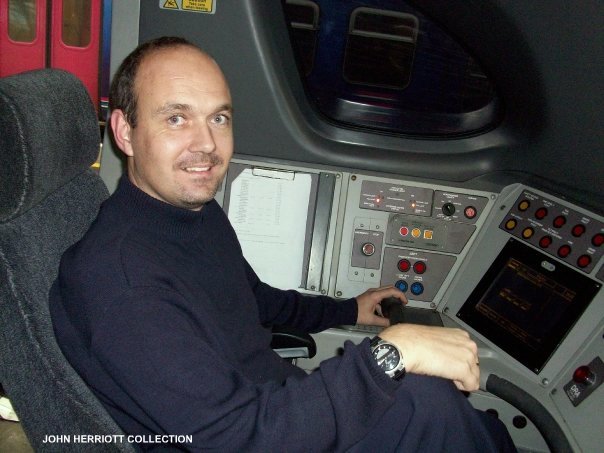
John Herriott at Brighton station on 06.12.2008
John served as a member on the Brighton Cross Country L.D.C
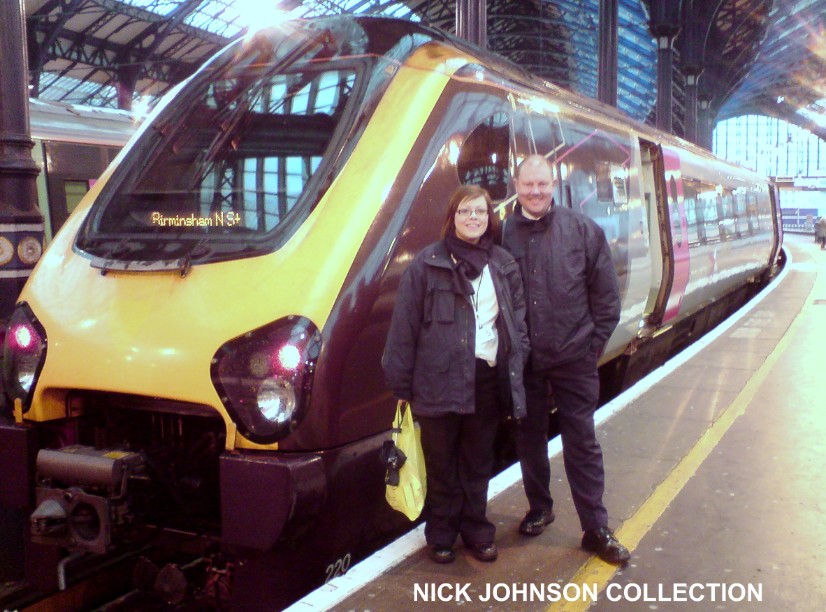
Rachel Johnson (nee Bowles) & Steve Brooke, just before the departure of 1M50, 1418
Brighton - B'ham New Street on the last day of operation, 13th December 2008.
This train normally ran through to Manchester but not that day!
With the closure of the Brighton depot Rachel transferred to Bristol Cross Country.
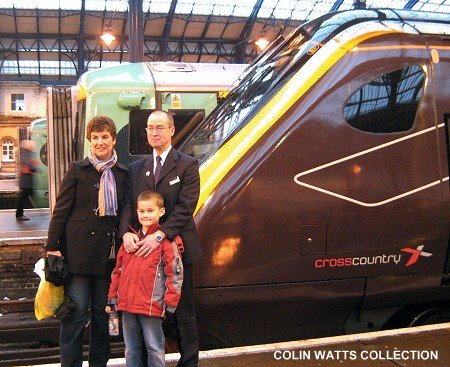
Dave Neish
Worked the 09:33 Birmingham New Steet - Brighton, on the last day of
the Cross Country Service on the 13th December 2008.
Dave is photographed with his family, just after his arrival at Brighton station